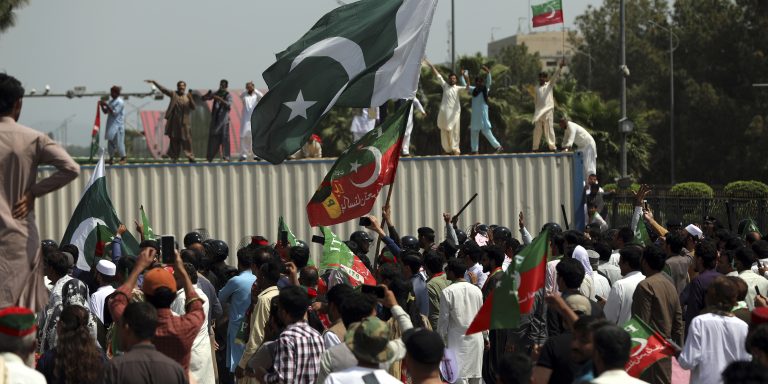INTELBRIEF
April 5, 2022
IntelBrief: Political Crisis in Pakistan Adds to South Asia Worries

Bottom Line up Front
- Pakistan’s Prime Minister Imran Khan has countered an attempt by a coalition of opponents to oust him from power.
- The political crisis might draw Pakistan’s powerful military back into direct intervention in politics after nearly 15 years in the background.
- Khan lost military backing and popular support because of the country’s severe economic difficulties and differences over relations with the United States.
- Any changes to Pakistan’s regional relationships, particularly with India, will be modest if Khan is replaced.
On April 3, Prime Minister Imran Khan moved to thwart an effort by a coalition of parties seeking to oust him from power before elections due in 2023. Apparently recognizing that the opposition had assembled the required majority for a no-confidence vote in Pakistan’s parliament, Khan’s ally in the parliament leadership ruled the motion unconstitutional, and another ally, Pakistan’s president, followed Khan’s instruction to dissolve the parliament. The dissolution triggers new national elections to be held within 90 days, with Khan remaining as chief executive until a caretaker prime minister, who will oversee the elections, is appointed. Pakistan’s Supreme Court did not immediately rule on the opposition’s challenge to Khan’s maneuver, suggesting that there might be no clear constitutional grounds on which to overturn Khan’s move to snap elections.
The political crisis was set off by a perception among Khan’s opponents that his public support had eroded over double-digit inflation and high unemployment, as well as his loss of the backing of Pakistan’s powerful army leadership. The opposition coalition—the Pakistan Democratic Movement (PDM)—includes groups linked to several past Pakistani leaders, including the Pakistan Muslim League (Nawaz), the party of Khan’s immediate predecessor Nawaz Sharif, and the Pakistan Peoples’ Party (PPP), dominated by the family of the slain former Prime Minister Benazir Bhutto. She was the Muslim world’s first elected female prime minister, and her husband and political partner, Asif Ali Zardari, served as President during 2008-2013, taking office after the military returned the country to civilian rule. The opposition apparently garnered enough votes to oust Khan, had the no-confidence motion received a vote, after persuading one of Khan’s minor coalition partners to defect. Had Khan been ousted, Nawaz Sharif’s brother, Shahbaz, was positioned to assume the prime ministership; Khan defeated him in the 2018 election that powered the former cricket star into office. Pakistan’s military leadership—whose past relationships with Khan’s opponents have been fraught with acrimony—denied playing any role either in the no confidence motion or Khan’s dissolution of parliament. But, the military’s relations with Khan have been deteriorating since late 2021, when he sought to retain an ally, the head of the Inter-Service Intelligence directorate (ISI), the secretive military intelligence agency that plays a leading role in both engaging and battling violent Islamist movements, particularly the Afghan Taliban.
The political crisis raises fundamental questions about Pakistan’s stability, an issue closely watched in neighboring India and internationally because of Pakistan’s nuclear status and the presence of global jihadist groups on Pakistani territory. On the eve of the planned no-confidence vote, Khan not only held large public rallies in support of his leadership, but he also accused his opponents of participating in a U.S.-led conspiracy. That accusation could set the stage for him to try to arrest opposition leaders and their supporters. An outbreak of significant political violence or public unrest could cause Pakistan’s military to return to ruling directly—a step that the army leadership has taken in the past in cases when, in their view, stability was threatened.
The battle between Khan and his opponents raises questions about Pakistan’s regional and international relationships. During his term, Khan has downplayed efforts to improve relations with India and instead sought to consolidate ties to Pakistan’s longstanding ally, China, as well as expand relations with Russia. Khan was visiting Moscow on the eve of the Russian invasion of Ukraine, a visit arranged despite U.S. warnings of severe sanctions on Russia if President Vladimir Putin went ahead with an attack. Pakistan later abstained on a General Assembly resolution denouncing the invasion. China perceives Pakistan as not only providing strategic leverage against India, but also as a key element in its ambitious Belt and Road Initiative to broaden trade and investment relationships from China to Europe. Although Khan has not improved Pakistan-India relations, many experts assess that no Pakistani leader would be able to dramatically alter India-Pakistan dynamics. The relationship has been highly acrimonious since the 1947 partition, including three major conventional wars, the specter of nuclear conflict between them, and, most recently in 2019, mutual military mobilizations following a minor clash. There is, nonetheless, always potential for renewed talks on their longstanding dispute over the India-controlled states of Jammu and Kashmir.
U.S. officials categorically denied Khan’s allegations that they supported efforts to oust him, but U.S leaders expect that a change of government in Pakistan would set the stage for better relations. Khan was a vocal critic of President Biden’s withdrawal of U.S. forces from Afghanistan, and he claimed that the announced withdrawal date emboldened the Taliban and diminished Pakistan’s influence over the movement. For their part, U.S officials blame Khan for obstructing a U.S. plan to re-establish intelligence and operational counterterrorism bases in Pakistan intended to compensate for the closure of such facilities in Afghanistan. Pakistan’s powerful Army Chief General Qamar Bajwa has contrasted the military’s position on U.S. relations with those of Khan by saying, in advance of the planned no-confidence motion, “we share a long and excellent strategic relationship with the U.S. which remains our largest export market.” He also sided with the U.S. stance on the Ukraine invasion, saying that Russia’s “aggression against a smaller country cannot be condoned.” Yet, even though New Delhi and Washington might benefit from a Khan exit, their differences with Pakistan are not necessarily amenable to wholesale resolution, even if a new prime minister is inaugurated in Islamabad.